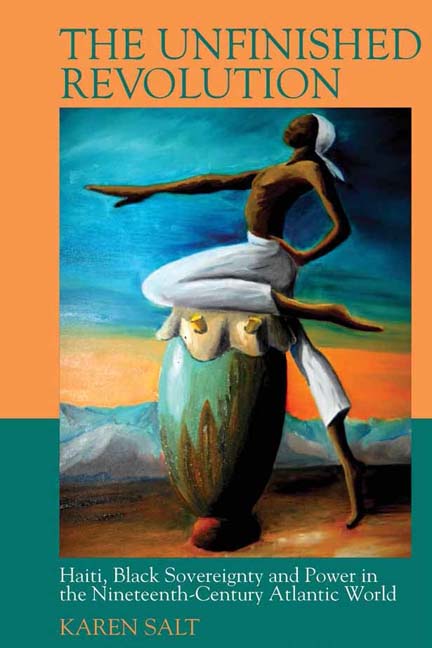 The Unfinished Revolution
The Unfinished Revolution Book contents
- Frontmatter
- Contents
- List of Figures
- Acknowledgements
- Introduction: Sovereignty and Power
- 1 Games of Sovereignty and Opportunity
- 2 Selling Citizenship, Recognising Blood, Stabilising Sovereignty
- 3 Burlesquing Empire: Performing Black Sovereignty on the World Stage
- 4 Welcome to the New World Order: Haiti and Black Sovereignty at the Turn of the Century
- 5 Sovereignty under Siege? Contemporary Performances of Black Sovereignty
- Bibliography
- Index
3 - Burlesquing Empire: Performing Black Sovereignty on the World Stage
- Frontmatter
- Contents
- List of Figures
- Acknowledgements
- Introduction: Sovereignty and Power
- 1 Games of Sovereignty and Opportunity
- 2 Selling Citizenship, Recognising Blood, Stabilising Sovereignty
- 3 Burlesquing Empire: Performing Black Sovereignty on the World Stage
- 4 Welcome to the New World Order: Haiti and Black Sovereignty at the Turn of the Century
- 5 Sovereignty under Siege? Contemporary Performances of Black Sovereignty
- Bibliography
- Index
Summary
Saint Domingue is first the “pearl” of the Antilles, the most perfected example of the plantation system, and then its egregious failure, a decline from splendour to unparalleled squalor in the years following independence. Lost in between is the emergence of the Haitian state itself.
Michael J. DrexlerIntroduction
I want to tell a story. The time is the 1850s. The place? Haiti. The narrative of the story foregrounds the political life of Faustin I, a forgotten Haitian monarch, his performance(s) of sovereignty and the ways that his machinations during this era would impact on the widespread use of images and objects that sought to transform Haitian sovereignty from parody to power. It is a narrative that also looks forward to the twentieth and twentyfirst centuries as it links activities from the past that challenged Haiti’s sovereignty under Faustin I to contemporary moments that illuminate the complexity of black sovereignty's constraints. Although the nineteenthcentury encounters described within this chapter occurred nearly half a century after Haiti's declaration of independence, they echo the unfinished sovereign encounters outlined in Chapters 1 and 2. These flashpoints highlight literary historian Michael Drexler's musings above about the ways that Haiti is tied to remnants of its colonial history as a perfect plantation machine, even as its revolutionary life challenged chattel slavery, colonialism and black nullification. It is not surprising if somewhere lost in those grand skirmishes is the Haitian state. As noted in earlier chapters, this book fills this gap and draws together a range of materials, perspectives, objects and political thought in order to delineate the forms and fractures of black sovereignty. Although much of this book focuses on the ways that Haitian officials, cultural workers and ancillary friends (and foes) made black sovereignty legible, contested its existence, or continued to fight for its relevancy in global politics, it also argues that black sovereignty was and is an unstable, unfinished figuration.
As tempting as it may be to wish for a teleological narrative of becoming that sees Haitians and others of African descent breaking off chains of enslavement and figurations of political dispossession before emerging as full sovereign agents, the figurations of black sovereignty, as chronicled in this project, resist such formulations.
- Type
- Chapter
- Information
- The Unfinished RevolutionHaiti, Black Sovereignty and Power in the Nineteenth-Century Atlantic World, pp. 113 - 152Publisher: Liverpool University PressPrint publication year: 2019


